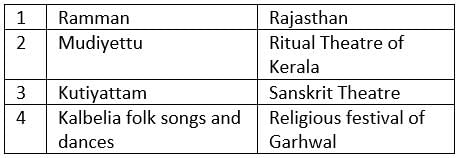Practice Test: Environment- 1 - BPSC (Bihar) MCQ
30 Questions MCQ Test - Practice Test: Environment- 1
The natural process of the atmosphere heating through the trapping of re-radiated infrared radiation is known as
Which energy is converted into electrical energy by a solar cell ?
How do CFCs reduce the concentration of ozone in the atmosphere?
Which of the following appears to contribute to global cooling rather than global warming?
A lichen is best characterized as a symbiosis between
Consider the following statements
1. Advanced Heavy Water Reactor is India’s third stage Nuclear programme
2. Thorium will be used as fuel in AWHR
3. Globally, Thorium is more abundant than Uranium
Select the correct option
Exploration of Shale gas in India is fraught by several issues. Consider the statements regarding this
1. It will severely affect ground water
2. It will give rise to release of green house gases
3. Hydraulic fracturing causes millions of very small and localized seismic events when the fractures are actually produced in the shale
Select the correct options
Hydrogen Fuel cells are emerging as fuel of the future due its potential to address energy crisis. Consider the statements regarding this
1. Hydrogen fuel cells converts chemical energy into electrical energy
2. They are more environment friendly as compared to other fuels like Coal and Natural gas etc.
3. The only concern is release of CO2 and excess heat after the reaction.
Select the correct codes
Consider the following regarding Coal Gasification
1. Coal gasification produces syngas
2. Coal gasification can be used for making ammonia and methanol
3. Coal gasification produces less carbon dioxide than tradition coal plants
Select the correct options
Consider the following
1. Carbon Dioxide
2. Methane
3. Hydrogen
4. Carbon Monoxide
5. Nitrogen
6. Sulphur Dioxide
Which of the above are constituent of SYNGAS?
Floods in Punjab-Haryana region are mainly result of
1. Improper drainage
2. High density of rivers/streams
3. Salt encrustation
4. Very heavy rainfall
Select the correct code:
Consider the statements regarding protective adaptation.
1. Cryptic coloration
2. Resemblance coloration
3. Warning coloration
Select the correct code:
Humus in soil is useful because it
1. Increases water retention in soil
2. Improves soil structure
3. Sets ground for capillary mechanism to enrich top layer with minerals from beneath.
Select the correct code:
Consider the areas focused in recently released World Bank’s report “Building Resilience
for Sustainable Development of the Sundarban”
1. Health issues of human settlements there.
2. Destruction of ecosystem services
3. Coastal mining.
Select the correct code:
Consider the statements about Soil health card scheme.
1. It will indirectly result into increase level of nutrient loading in local streams.
2. It would reduce the problem of temporary inundation.
3. It has been rolled out to check the excess use of fertilizers.
Select the correct code:
Which Southern railway station has earned the unique distinction of being the first energy efficient A1 category station in India?
Consider the statements regarding Nano pollution:
1. Living organisms may not have appropriate means to deal with Nano wastes as Nanoparticles
don’t appear in nature
2. Due to their size, they can penetrate the animal cells but not plant cells as they have mechanism of Nano particles filtration.
3. Nano-particles do not have any impact on human immune system.
Select the correct code:
What do you think would help in securing the nutrition security for impoverished masses of India?
1. By emphasizing over Bio fortification.
2. By including coarse grains in PDS system.
3. By creating enabling environment for cooperative type of functioning.
4. Increasing cultivation cover for rice and wheat.
5. By increasing processing capacities in India.
Select the correct code:
Biodiversity is highest in which type of the following forests?
Consider the statements regarding global energy subsidies
1. U.S.A is the largest spender on energy subsidies while china stands at second place.
2. Energy subsidies exceed the estimated public health spending for the entire globe.
Select the correct code:
Namami gange programme would implicitly strengthen the Indian compliance to
1. Convention of biological diversity.
2. Ramsar convention.
3. Convention on the Conservation of Migratory Species of Wild Animals (CMS)
Select the correct code:
Consider the following species
1. Whales
2. Sharks
3. Polar Bears
4. Gazelles
Which of the following species have been recently given protection under UN Conservation ofMigratory Species of Wild Animals (CMS)?
Consider the following
1. Mushroom
2. Cocoa
3. Flowers
4. Root and tuber crops
Which of the above is part of horticulture?
Consider the following regarding fisheries production
1. India is the largest producer of fish in the world
2. India is the second largest producer of fresh water fish in the world
Select the wrong statement/s
With reference to ‘Pradhan Mantri Ujjwala Yojana’, which among the following statements is/are correct?
1. The objective of the scheme is to safeguard the health of women and children by providing them with clean cooking fuel
2. The Government has set a target of 25 crores LPG connections under the Yojana.
Select the correct answer using the codes given below.






















